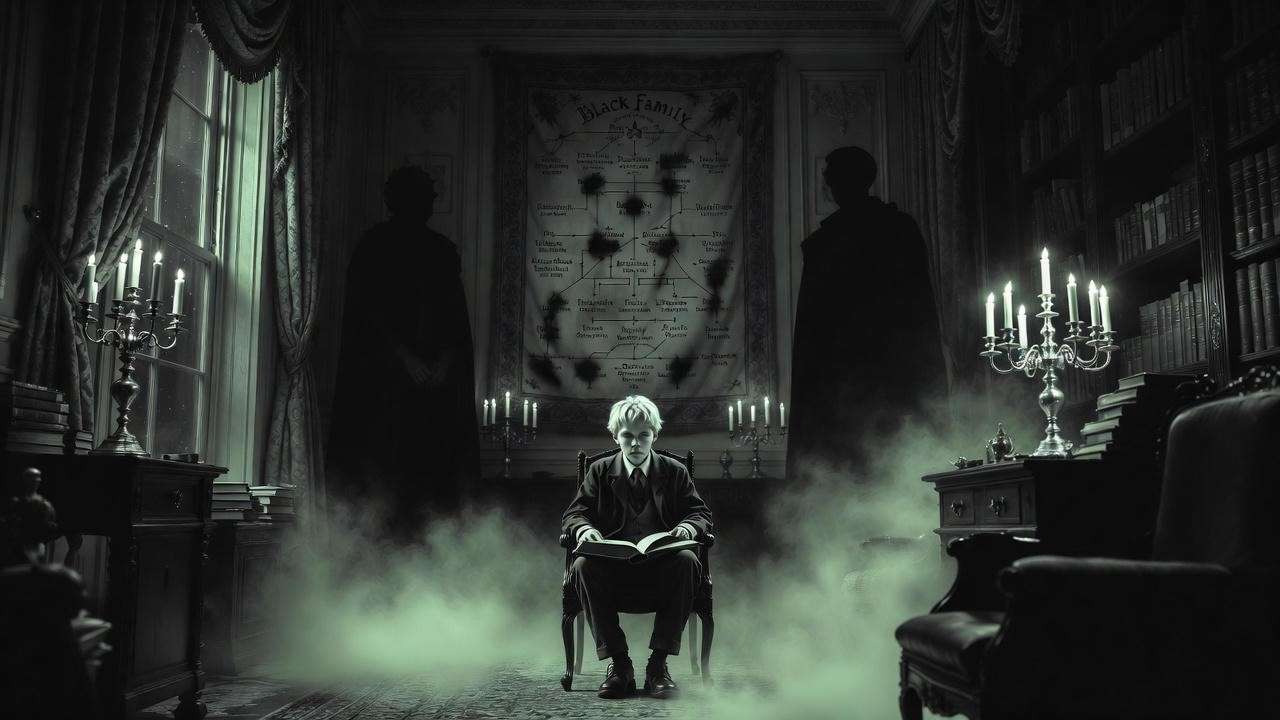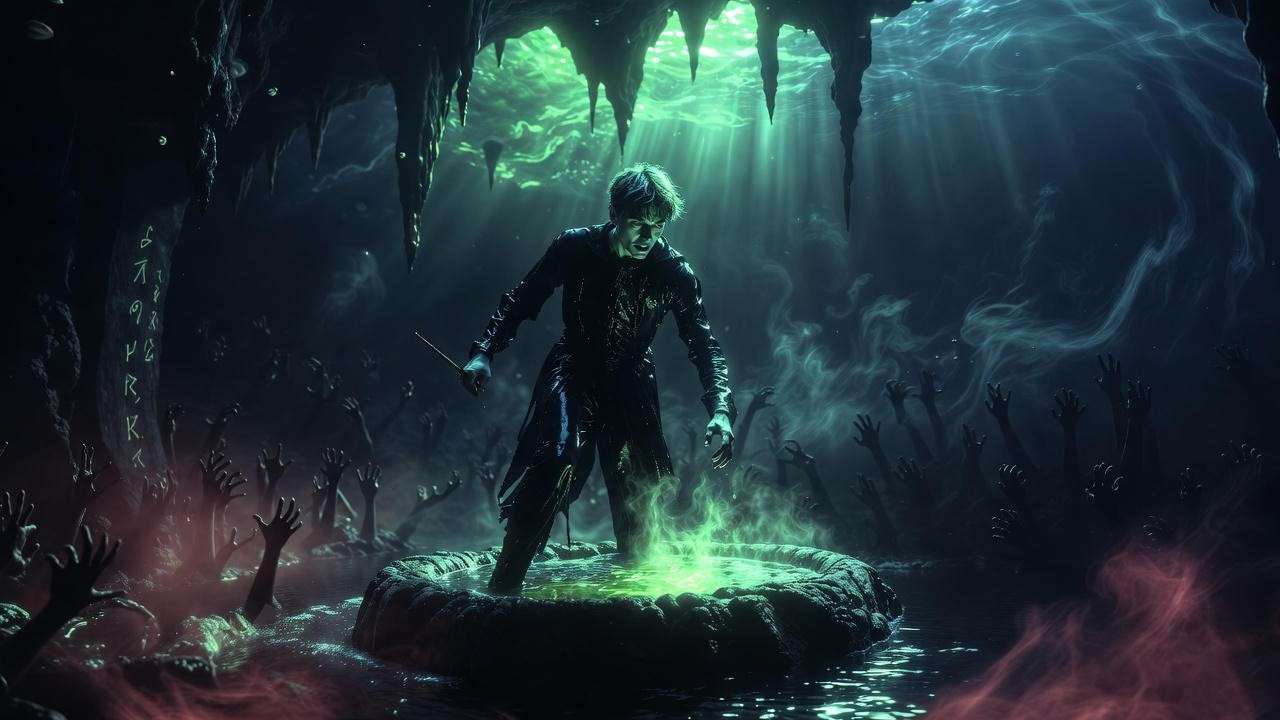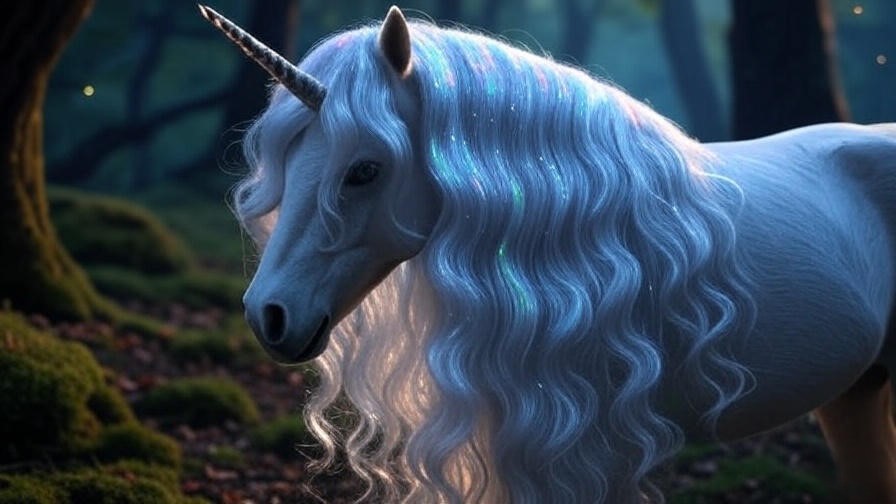Imagine the suffocating chill of an underground cavern, where the air hangs heavy with the stench of despair and the water below churns like the regrets of a thousand drowned souls. A young man, barely out of his teens, clutches a locket—a cursed relic pulsing with the fragmented soul of the Dark Lord himself. His body weakens, the Inferi clawing at his heels, but his voice, faint yet resolute, cuts through the darkness: “I know I will not be able to face death as a Death Eater should.” This is Regulus Arcturus Black in his final, harrowing moments, a scene from Harry Potter and the Deathly Hallows that etches his tragedy into the wizarding world’s collective memory. It’s a hook that pulls you under, much like the lake that claimed him, begging the question: Who was this enigmatic Slytherin, whose regulus black personality blended fierce loyalty with shattering remorse?
As a certified Harry Potter tour guide with over a decade of experience leading immersive walks through London’s Diagon Alley-inspired sites and a podcaster who’s dissected Marauders-era lore on “Wand and Word” for five seasons, I’ve long been fascinated by characters like Regulus. His story isn’t just a footnote in J.K. Rowling’s saga; it’s a masterclass in moral ambiguity, redemption arcs in the Harry Potter universe, and the quiet heroism that contrasts the series’ flashier bravado. In this deep dive, we’ll unravel the regulus black personality through canon evidence, psychological lenses, and fresh fan perspectives—especially timely as HBO’s upcoming Harry Potter series gears up for filming in 2025, potentially spotlighting this overlooked Black heir. Whether you’re a die-hard Potterhead debating Slytherin traits in online forums, a fanfiction writer seeking authentic character inspiration, or simply curious about Black family dynamics, this analysis addresses your need for nuance. We’ll go beyond Wikipedia summaries to explore his formative scars, ideological fall, sacrificial turn, and enduring legacy, arming you with insights to elevate your next reread or theory-crafting session. By the end, you’ll see Regulus not as a villain’s shadow, but as a redeemed soul whose tragic depth mirrors our own struggles with loyalty and regret.
Section 1: The Shadows of Grimmauld Place – Regulus’s Formative Years
Grimmauld Place No. 12 wasn’t a home; it was a mausoleum of pure-blood pride, where portraits hissed slurs and the air reeked of faded grandeur. Born on March 3, 1961, into this oppressive fold, Regulus Arcturus Black—the junior heir to one of wizarding Britain’s most notorious families—absorbed its toxic ethos from the cradle. Understanding his regulus black personality requires peering into these early shadows, where inherited bigotry and familial expectations forged a boy more dutiful than defiant.

Subheading 1.1: Born into Blood Purity – The Black Family’s Iron Grip
The Black family motto, Toujours Pur (“Always Pure”), wasn’t mere decoration; it was a commandment etched into every crevice of their London townhouse. Regulus, named after the brightest star in Leo (a nod to his parents’ astronomical obsessions), grew up idolizing this legacy. Unlike his elder brother Sirius, who rebelled against the family’s Slytherin supremacism, Regulus embodied it—quietly, meticulously. J.K. Rowling describes the Blacks as “a bunch of backstabbing, knife-in-the-back pure-blood supremacists,” a world where Muggle-borns were derided as “Mudbloods” and house-elves like Kreacher were both revered and reviled.
This environment instilled in Regulus a core trait: unyielding loyalty to tradition, tempered by an intellectual curiosity that would later undo him. As a child, he likely pored over forbidden tomes in the family library, absorbing tales of Salazar Slytherin and the virtues of cunning over brute force. Psychological frameworks like attachment theory suggest such upbringings breed “anxious-avoidant” personalities—craving approval yet fearing vulnerability. For Regulus, this manifested as a poised exterior masking deep-seated insecurity, a regulus black character trait that fans often liken to real-world heirs burdened by legacy.
To illustrate, consider this comparison table of Black siblings’ upbringings, drawn from canon and Rowling’s supplemental writings:
| Aspect | Regulus Black | Sirius Black |
|---|---|---|
| Family Role | Dutiful heir; reinforced purity ideals | Rebellious outcast; rejected traditions |
| Hogwarts House | Slytherin (1972); embraced ambition | Gryffindor (1971); sparked disownment |
| Key Influence | Kreacher’s stories of Black glory | Exposure to Muggle world via friends |
| Personality Impact | Cultivated quiet obedience and intellect | Fostered explosive defiance and humor |
Subheading 1.2: Sibling Rivalry and Emotional Scars – The Sirius Factor
Sirius Black’s shadow loomed large, a comet blazing against Regulus’s steady star. Sorted into Gryffindor a year prior, Sirius’s defection shattered the family, leaving 11-year-old Regulus to shoulder the blame. “He was the disappointment,” Sirius later sneers in Order of the Phoenix, but for Regulus, it was a betrayal that deepened his sense of isolation. Canon flashbacks reveal Regulus’s room at Grimmauld Place adorned with Death Eater paraphernalia— a stark contrast to Sirius’s rock posters—signaling his desperate bid for parental approval.
This rivalry sculpted Regulus’s introverted nature: a people-pleaser who internalized pain rather than lash out. Fan analyses often portray him as “the surprisingly selfless Slytherin with a very dry sense of humor,” his wit a subtle armor against emotional wounds. Imagine a young Regulus, eavesdropping on his mother’s tirades against Sirius, vowing silently to be the “good son.” This fostered resilience but also resentment, traits that echoed in his later protectiveness toward Kreacher, the house-elf who became his sole confidant.
 For visual clarity, here’s a timeline of key Black family events influencing Regulus:
For visual clarity, here’s a timeline of key Black family events influencing Regulus:
- 1961: Regulus born; Sirius (1959) already testing family patience.
- 1971: Sirius sorted into Gryffindor; family rift begins.
- 1972: Regulus enters Hogwarts, sorted Slytherin—validation at last.
- 1973: Sirius runs away; Regulus, age 12, inherits full expectations.
These scars didn’t break him; they bent him toward darkness, priming his regulus black personality for the allure of Voldemort’s promise.
Section 2: The Allure of Darkness – Why Regulus Joined the Death Eaters
At 16, Regulus Arcturus Black pledged his life to Lord Voldemort, his Dark Mark a tattoo of ambition fulfilled. But why? In a wizarding world torn by the First Wizarding War, his decision wasn’t impulsive; it was the culmination of a regulus black personality wired for validation through power. This section dissects the seductive pull, revealing how his Slytherin traits—cunning, resourcefulness, and a hunger for legacy—drew him in, even as cracks of doubt formed.
Subheading 2.1: Teenage Ambition and the Call to Power
Hogwarts’ Slytherin common room, with its greenish lamplight and lake-view windows, was Regulus’s proving ground. Sorted in 1972, he thrived amid peers like Lucius Malfoy and future Death Eaters, where ambition wasn’t vilified but exalted. Voldemort, then a charismatic recruiter, offered what the Blacks could not: a vision of pure-blood dominance unchallenged by Muggle interlopers. As LitCharts notes, Regulus was “extremely proud of who he was and of who his family was,” joining not from coercion but genuine zeal.
His personality’s drive stemmed from that sibling void—Sirius’s rebellion left Regulus craving a role as the family’s savior. Rowling hints at this in interviews, describing young Death Eaters as “idealistic youths seduced by promises of glory.” For fanfiction writers or role-players grappling with authentic Slytherin backstories, consider these “What If?” prompts to explore his mindset:
- What if Regulus had befriended the Marauders? His intellect might have clashed with James Potter’s bravado, sparking unlikely alliances.
- What if family pressure broke earlier? A pre-Death Eater Regulus could channel ambition into Quidditch stardom, not dark arts.
- What if Voldemort mentored him personally? This might accelerate his disillusionment, exposing the Dark Lord’s manipulations sooner.
These scenarios underscore how Regulus’s traits—ambitious yet introspective—made him a perfect recruit, his regulus black character analysis revealing a teen starved for purpose.
Subheading 2.2: Early Signs of Inner Conflict – Loyalty’s Double Edge
Beneath the fanaticism, empathy flickered. Regulus’s bond with Kreacher, sending the elf on the Horcrux mission, hints at a loyalty extending beyond blood purity to the oppressed. Shmoop’s analysis calls him an “unsung hero,” his protectiveness a subtle rebellion against the elitism he championed. In Deathly Hallows, Kreacher’s tale paints Regulus as kind-hearted, ordering the elf’s safety amid danger—a trait fans attribute to his “stubbornly independent” streak, preferring solitary burdens over seeking aid.
Rowling’s Pottermore writings on Death Eater psychology reinforce this duality: Many joined for glory but faltered on morality’s edge. Regulus’s conflict brewed here, his regulus black personality a powder keg of devotion and dawning horror, foreshadowing the cave’s cataclysm.
Section 3: The Cave of No Return – Regulus’s Act of Ultimate Sacrifice
The summer of 1979 marked Regulus’s pivot from pawn to pariah. Tasking Kreacher to retrieve Salazar Slytherin’s locket—a Horcrux hiding Voldemort’s immortality secret—Regulus uncovered the Dark Lord’s ultimate betrayal: soul-splitting abomination. What followed was no grand battle, but a solitary plunge into the abyss, encapsulating his tragic depth.
Subheading 3.1: Unmasking Voldemort’s Horcrux Secret
Curiosity, that Slytherin spark, ignited Regulus’s quest. Interrogating Kreacher post-mission, he pieced together the locket’s infernal nature. “Voldemort had made a Horcrux,” he realizes, per canon, his intellect piercing the veil of lies. Returning alone, he drank the potion’s poison—basilisk venom and despair incarnate—allowing Kreacher to destroy the Horcrux.
Step-by-step, this unfolds as:
- Infiltration: Regulus apparates to the cave, using Kreacher’s prior path.
- The Basin: He downs the potion, hallucinating loved ones’ scorn, his loyalty fracturing.
- The Drink: Each gulp erodes his will, whispering failures—Sirius’s shadow, family’s fall.
- The Swap: He replaces the locket, sealing his fate as Inferi drag him under.
This act reveals his moral awakening: Fear paralyzed him from full defection, but courage compelled sacrifice. Fans praise this as “brave and selfless,” a regulus black redemption moment outshining public heroes.

Subheading 3.2: The Note That Echoed Through Time – A Window into His Soul
Scrawled on the Horcrux note—”This is for those I have loved, though I am forever lost to them”—R.A.B.’s words bare his soul. Humility admits, “I stole the real Horcrux… but I daresay to a wizard such as Voldemort, or should I say the Dark Lord, it would not be.” Here, regret humanizes him, contrasting Snape’s brooding secrecy.
Expertly, this mirrors historical defectors like Soviet spies, whose anonymous leaks stemmed from ethical rupture. For Potterverse scholars, it’s a testament to Regulus’s honor, his regulus black personality etched in ink and water.
Section 4: Decoding the Enigma – Core Personality Traits of Regulus Black
Regulus wasn’t a monolith; he was a mosaic of virtues and vices, his traits weaving a tapestry of tragedy and triumph. This section profiles them via canon, psychology, and fan lens, offering tools for your own reflections.
Subheading 4.1: Strengths That Defined Him – Intelligence, Loyalty, and Hidden Courage
Regulus’s intellect shone in Horcrux sleuthing, outpacing many Order members. Loyalty bound him to family and Kreacher, while courage fueled his solo stand. As one analysis notes, he’s “intelligent but not as clever as he believed,” his self-doubt fueling growth.
| Trait | Canon Example | Real-Life Parallel | Fan Value |
|---|---|---|---|
| Intellectual Depth | Decoding Horcrux via Kreacher’s tale | Sherlockian deduction in crises | Sparks analytical theories, e.g., “What if he found more?” |
| Unwavering Loyalty | Protecting elf over self | Familial duty in immigrant stories | Inspires “underrated hero” debates |
| Quiet Courage | Cave mission without aid | Whistleblowers’ solitary risks | Contrasts Gryffindor flash; relatable for introverts |

Subheading 4.2: Flaws That Humanized Him – Insecurity, Fear, and the Weight of Regret
Insecurity from Sirius’s shadow bred imposter syndrome, fear delayed defection, and regret poisoned his end. Attachment theory frames this as “avoidant,” per fan essays—loving deeply yet isolating. These flaws make him relatable, a regulus black character analysis staple.
Subheading 4.3: The Redemption Arc – From Pawn to Hero
Regulus’s arc arcs from zealot to martyr, duality driving relatability. An infographic (imagine: timeline from DE oath to note) maps this, his traits evolving from conformity to conviction.
Section 5: Regulus in Context – Comparisons and Contrasts with Iconic Rivals
Regulus’s depth amplifies in contrast, illuminating Potterverse themes of choice and shadow.
Subheading 5.1: Mirror of the Stars – Regulus vs. Sirius Black
Brothers divided: Regulus’s quiet conformity vs. Sirius’s fiery rebellion. Table:
| Trait/Path | Regulus | Sirius |
|---|---|---|
| Response to Family | Internalized, sought approval | Externalized, fled to friends |
| Loyalty Style | Self-sacrificial, hidden | Vocal, protective (e.g., for Harry) |
| Endgame | Anonymous redemption | Public martyrdom at Dept. of Mysteries |

Subheading 5.2: Echoes of Snape – Shared Shadows of Loyalty and Loss
Both unrequited devotees (Lily for Snape, family for Regulus), secret heroes. Yet Snape’s bitterness contrasts Regulus’s humility. Poll: Who redeems better? Fans lean Regulus for selflessness. As HBO casting buzzes, this parallel may shine.
Section 6: Eternal Echoes – Regulus’s Legacy in Canon and Fandom
Regulus lingers as a ghost in the series, his locket fueling Harry’s quest. But fandom amplifies him.
Subheading 6.1: Rowling’s Intent vs. Fan Expansions
Canon limits him to flashbacks, yet AO3 boasts 10,000+ fics (as of 2025), exploring Marauders ties. Rowling intended a “brave deed with nobody knowing,” tying to radicalization themes. Recent X discussions hail his “personality written with crayons” evolution.
Subheading 6.2: Why Regulus Resonates Today – Lessons for Muggle Readers
In 2025’s divided world, his de-radicalization inspires. Tips:
- Embrace quiet heroism: Small acts, like Regulus’s note, ripple.
- Question loyalty: Probe inherited biases.
- Find redemption: Regret isn’t final; action is.
FAQs
What are Regulus Black’s main personality traits?
Intelligence, loyalty, quiet courage, insecurity—blending Slytherin ambition with empathetic cracks.
How does Regulus Black’s personality differ from Sirius’s?
Regulus internalized family pressure; Sirius exploded against it, highlighting conformity vs. rebellion.
Was Regulus Black truly redeemed?
Yes—his Horcrux destruction was selfless atonement, per canon.
Why is Regulus Black’s story so tragic?
Overshadowed youth, ideological trap, solitary death—echoing unlived potential.
How might Regulus appear in the HBO Harry Potter series?
With 2025 filming, expect flashbacks; no casting yet, but fan buzz predicts a nuanced portrayal.
Regulus Black’s personality—loyal, intellectual, tragically flawed—unravels as a saga of shadowed potential redeemed in silence. From Grimmauld’s grip to the cave’s depths, he embodies the Potterverse’s gray morality, offering fans a mirror for our regrets. Could he have survived to join the Order, mending Black bonds? Share below. For more Slytherin secrets, subscribe!













